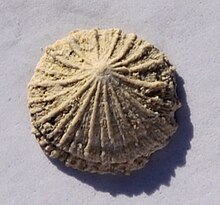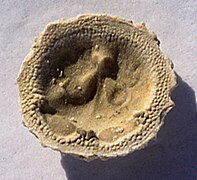| Isocrania Temporal range: Turonian–Danian PreꞒ Ꞓ O S D C P T J K Pg N | |
|---|---|

| |
| Isocrania egnabergensis, 7 mm Ø | |
| Scientific classification | |
| Domain: | Eukaryota |
| Kingdom: | Animalia |
| Phylum: | Brachiopoda |
| Class: | Craniata |
| Order: | Craniida |
| Family: | Craniidae |
| Genus: | †Isocrania Jäckel, 1902 |
| Species | |
| |
Isocrania is an extinct genus of brachiopods found during the Upper Cretaceous. Early representatives were attached to the underground, but later species are presumed to be free living at an increasingly earlier age. This was probably an adaptation to the increasing very thick and fine sedimentation during the latest Cretaceous.
Description
Isocrania is round to ovate, up to 1 cm in diameter, and has 15-65 strong ribs, that start at ±½mm from the origin of growth (or umbo). These ribs may extend beyond the edge of the valves. The umbo is not precisely in the centre of the valve. The attachment area is smaller than usual, and virtually absent in adults of later species. The dorsal valve is conical, the ventral valve flat to conical, flatter for adolescents and earlier species. The inner edge of the valves is flattened and grainy.
Species and distribution
- I. campaniensis is known from the Upper Cretaceous of Belgium (Upper Campanian, Craibel Quarry, Obourg, Craie d'Obourg and Craie de Trivieres Formations, 50.4° N, 3.9° E).
- I. costata has been found in the Upper Cretaceous of France (Lower Campanian, d'Avezac Formation, Tercis, 43.7° N, 1.1° W; and Upper Campanian, Tercis, Les Vignes Formation), Denmark (Maastrichtian, Nye Klov 3-7, 55.5° N, 12.5° E) and the Lower Paleogene of Denmark (Lower Danian, Nye Klov 8, 9 and 20-28, 55.5° N, 12.5° E). This species occurs in sediments from quiet, deep, off-shore waters, which is consistent with the fact that the preservation state is excellent and many specimens have boring holes testifying that they were predated by molluscs.
See also
References
- Simon, Eric (2007). "A new Late Maastrichtian species of Isocrania (Brachiopoda, Craniidae) from The Netherlands and Belgium" (PDF). Bulletin de l'Institut Royal des Sciences Naturelles de Belgique (77): 141–157. Archived from the original (PDF) on 2014-09-24. Retrieved 2014-09-20.
- Lee, D.E.; Burton, C.H.C. (1986). "Neocrania n.gen., and a revision of Cretaceous-Recent brachiopod genera in the family Craniidae". Bulletin of the British Museum (Natural History), Geology Series. 40: 141–160. ISSN 0968-0462.
- Simon, E. (2000). "Upper Campanian brachiopods from the Mons Basin (Hainaut, Belgium): the brachiopod assemblage from the Belemnitella mucronata Zone". Bulletin de l'Institut Royal des Sciences Naturelles de Belgique, Sciences de la Terre. 70: 129–160. cited in Marko Manojlovic. "Isocrania campaniensis". Fossilworks. Retrieved 17 December 2021.
- Odin, G.S. (2001). "The Campanian-Maastrichtian stage boundary". Development in Palaeontology and Stratigraphy. 19: 1–881. cited in Loic Villier. "Isocrania costata-Cretaceous of France". Fossilworks. Retrieved 17 December 2021.
- Surlyk, F.; Johansen, M.B. (1984). "End-Cretaceous brachiopod extinctions in the chalk of Denmark". Science. 223 (4641): 1174–1177. Bibcode:1984Sci...223.1174S. doi:10.1126/science.223.4641.1174. PMID 17742931. cited in Karen Layou. "Isocrania costata". Fossilsworks. Retrieved 17 December 2021. and Karen Layou. "Isocrania costata". Fossilsworks. Retrieved 17 December 2021.
- Surlyk, Finn (1984). "Autecology and taxonomy of two Upper Cretaceous Craniacean brachiopods". Bulletin of the Geological Society of Denmark. 22: 219–243.
| Taxon identifiers | |
|---|---|
| Isocrania | |
This brachiopod-related article is a stub. You can help Misplaced Pages by expanding it. |

